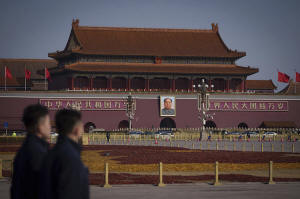The economy and AI are likely to be among the top issues for China’s
legislature
[March 04, 2025] By
SIMINA MISTREANU
BEIJING (AP) — Harnessing the power of artificial intelligence and
shoring up the economy are among the issues expected to top the agenda
when China’s legislature meets Wednesday in Beijing.
Almost 2,900 delegates have arrived in Beijing for the annual session of
the largely rubber-stamp parliament, the National People’s Congress.
Concomitantly, an advisory body of business leaders, athletes and
academics, the Chinese People’s Political Consultative Conference,
convened Tuesday. The two bodies’ concurrent meetings are known as the
Two Sessions.
The weeklong parliamentary session, though largely ceremonial, helps to
signal government priorities for the year. Premier Li Qiang is expected
to announce an economic growth target of around 5%, in line with the
past couple of years.
The meetings come as China’s economy struggles with sluggish
consumption, a lengthy property crisis, ballooning government debt and a
possible renewed trade war with the United States. On Tuesday, Beijing
announced additional tariffs of up to 15% on imports on U.S. farm
products including chicken, pork, soy and beef. The move came in
retaliation for an increase in flat U.S. tariffs on Chinese products –
from 10% to 20% – that came in effect at the same time.

“Undoubtedly, the adverse impacts brought by the external environment
have deepened, and China’s economy still faces some difficulties and
challenges,” said Lou Qinjian, spokesman for the National People’s
Congress in a news conference ahead of the session.
“Internationally, rising economic and political uncertainties make it
harder to stabilize external demand. Domestically, demand is
insufficient, and some enterprises are experiencing operational
difficulties,” he added.
The government is expected to announce some measures to boost
consumption such as increasing the deficit ratio from 3% to 4%, though
massive stimulus is unlikely.
[to top of second column] |

Chinese paramilitary policemen stand guard during a preparatory
session meeting of China's National People's Congress (NPC) with the
background of Tiananmen gate in Beijing, China, Tuesday, March 4,
2025. (AP Photo/Vincent Thian)
 Harnessing the power of artificial
intelligence may also feature in policy announcements.
Lou described China’s breakthrough DeepSeek AI model, unveiled
earlier this year, as an example of the country’s “innovative and
inclusive approach to technology.”
The delegates are also set to review a law aimed at improving market
conditions for private enterprises, as part of the government’s
wider effort to signal support for the public sector to shore up
growth.
Chinese President Xi Jinping met in February with business leaders,
including Alibaba founder Jack Ma and Huawei CEO Ren Zhengfei,
signaling support at the highest level of leadership.
“Xi realizes he needs the private sector to keep his underlying
priorities chugging along,” said Neil Thomas, a fellow on Chinese
politics at the Asia Society Policy Institute. “Improving China’s
innovation capabilities, improving China’s technological
self-reliance - the private sector is pretty good at this stuff, and
Xi wants to harness rather than set free the private sector energy
to achieve these goals.”
Beijing is also expected to unveil its defense budget for 2025. Last
year, China announced a 7.2% increase in its defense budget, which
is the world’s second-highest behind the United States’.
___
Associated Press writer Ken Moritsugu contributed to this report.
All contents © copyright 2025 Associated Press. All rights reserved |